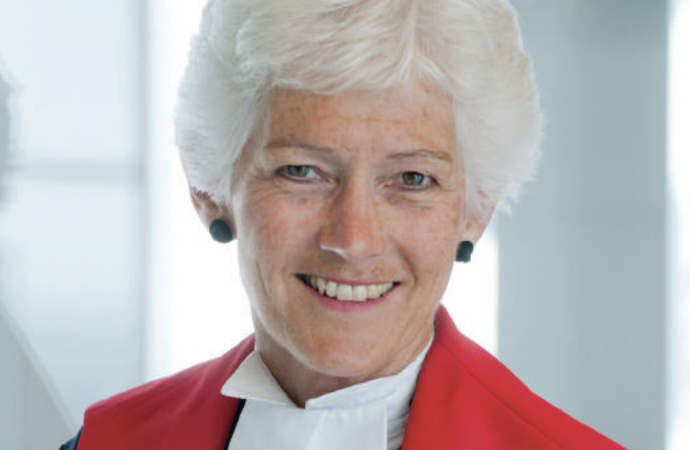Alumni Profile: Justice Rosemary Nation (LLB '79)
 The Honourable Justice Rosemary Nation (LLB '79)
The Honourable Justice Rosemary Nation (LLB '79)
By Allison Lawlor
When Justice Rosemary Nation (’79) sheds her judicial robes, it will likely be to put on a pair of hiking boots or climbing skins to explore the wilderness near her home in Calgary.
Her love of the Rocky Mountains and the development pressures she witnessed around Lake Louise, AB, in the late ’70s led her to do a Master of Laws (LLM) degree at the Schulich School of Law. “I was really interested in, how to preserve those lands for future generations,” said Justice Nation, a judge of the Alberta Court of Queen’s Bench.
“It wasn’t as sexy to be doing environmental work in the ’70s as it is today. A lot of it was letter-writing campaigns.”
At the time, Justice Nation volunteered with the National and Provincial Parks Association of Canada, now called Canadian Parks and Wilderness Society (CPAWS). Formed in 1963, the society focused on revitalizing the country’s appreciation for wilderness parks. Justice Nation’s own appreciation for the outdoors had developed through her adventures as a Girl Guide.
She moved across the country to attend Dalhousie University, lured by a Killam Scholarship and the chance to study environmental law with William Charles (’58), a former dean of the law school and Barry Stuart, a retired chief justice of the Yukon Territorial Court.
For her thesis, she investigated aspects of the Canada National Parks Act and development applications, as well as routes for establishing national parks. After completing her LLM, she returned to Calgary to join Burnet, Duckworth & Palmer, the firm where she articled after completing her law degree at the University of Alberta in 1976.
While articling, she had worked alongside a dozen lawyers; after her return from Halifax, she became one of about 40 lawyers at the fast-growing firm. She remembers the ’70s as a time of unprecedented growth in Calgary. As oil prices soared so too did the city’s population and skyline.
Outside of her legal practice, Justice Nation held executive positions in the Calgary chapter of CPAWS until the late 1980s when the eldest of her two sons was born. Pursuing a LLM degree not only allowed Justice Nation to explore environmental law, but it also clarified that she didn’t want to teach—an idea she considered—and instead, cemented her desire to pursue a legal practice focused on litigation, family law and insurance defense work.
When she was federally appointed to the Alberta Court of Queen’s Bench in 1997, she was a partner at Burnet, Duckworth & Palmer and one of Calgary’s top female litigation lawyers; a lawyer known for her thoroughness and deep understanding of the intricate details of each case.
“When I was in law school people said to me that as a woman you will have to work twice as hard to get half the recognition,” she said. “As women lawyers in the late ’70s, we all had a pressure on us that we had to work hard to succeed. We knew that we were being watched. And we knew we had been given a lot of opportunity and we needed to open doors for other people.”
Born in England, Justice Nation grew up in Calgary, the daughter of immigrant parents. Having skipped a grade in elementary school, she was 19 years old when she entered law school. After graduating in a class made up of only 15 per cent women, she decided to take a year off and explore the world outside Alberta.
She set off for Nigeria where she spent time volunteering with Crossroads International, a Canadian development organization. “I was interested in how there could be such inequalities in the world and being young and naïve I thought there should be an easy answer,” she said.
Living in Africa and helping in a physiotherapy clinic for children with polio was an invaluable experience. “It was a great opportunity to see a completely different society.”
Throughout her notable legal career, she has maintained a desire to help those less fortunate. Early in the COVID-19 pandemic, she organized a fundraiser that involved cloth face masks made by a local business from recycled judicial robes. The masks incorporated the black, red and white sections of the robes. More than 40 judges took part and raised $97,900 for local charities.
Now with supernumerary status, Justice Nation plans to retire from the Bench in the next few years. Once the constraints of being a judge lift, she expects to expand her voluntary work.
She currently volunteers with the International Association of Women Judges which is helping to settle 26 female judges and their families who fled from Afghanistan after the Taliban takeover. The Canadian government has agreed to relocate them to Canada.
Justice Nation is also interested in projects that will help more Indigenous students pursue a law degree, whether they have the goal of practicing law or want to obtain valuable legal training as a path to leadership in another profession.
“When I look at my own experience, I think that there is a real value for people in a minority group to have legal training,” she said. “The Indigenous community faces many, many challenges. They need to come up with their own ideas and solutions and we need to mentor them and support them and not stand in their way.”

